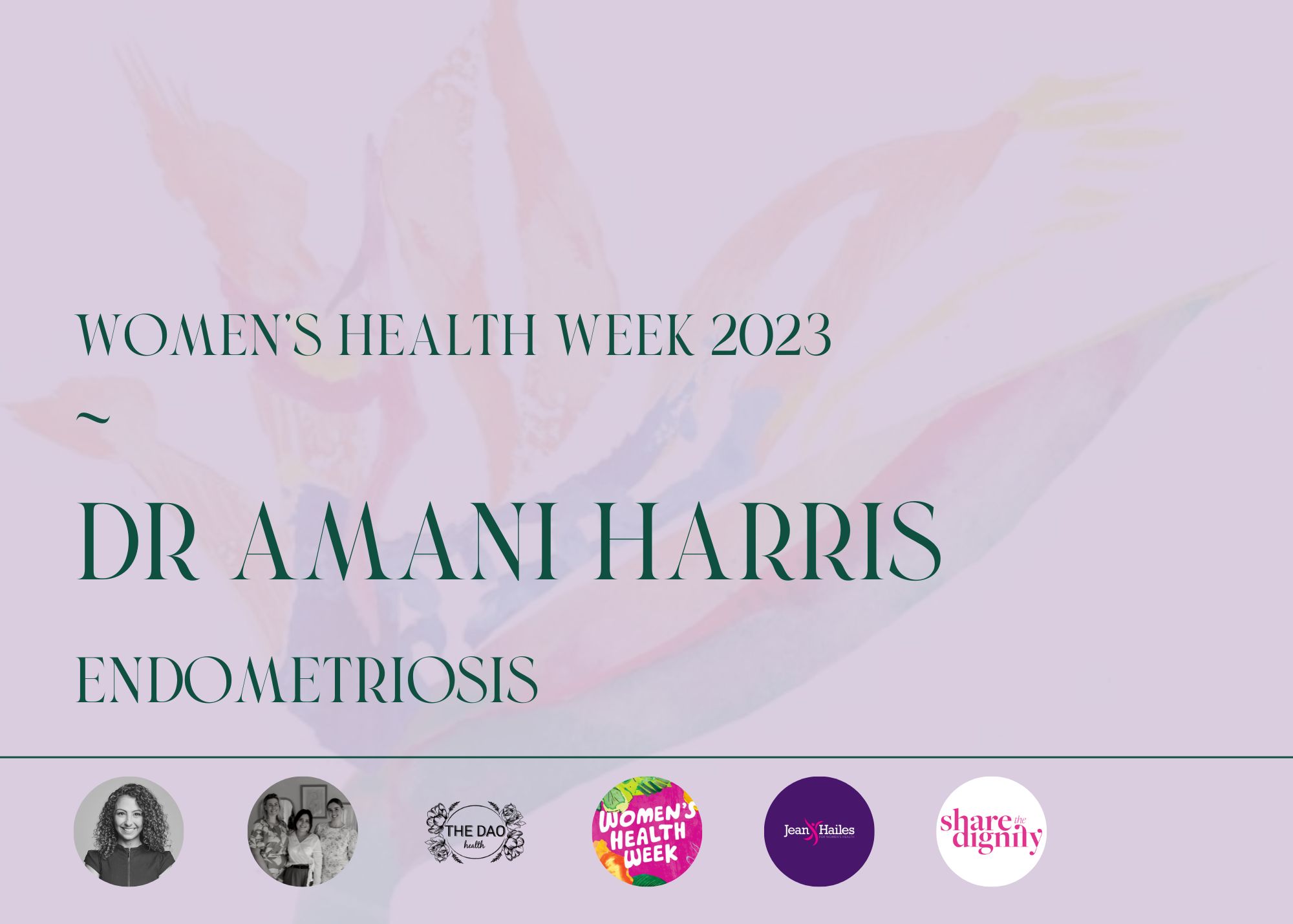The Dao Does X Jean Hailes Women’s Health Week 2023 Journal Series ~
The Progress on Endometriosis & Diagnosis with Advanced Endoscopic (Laparoscopy and Robotic) Gynaecologic Surgeon, Obstetrician Dr. Amani Harris ~
Traditional Chinese Medicine treatment including Acupuncture and Chinese Herbal Medicine provides a low-risk and evidence-based treatment for Endometriosis management. Acupuncture as a treatment for Endometriosis targets physiological mechanisms that drive Endometriosis including Prostaglandins and inflammation. Clinical trials have shown Acupuncture to provide significant analgesia for menstrual pain and shortening the duration of Dysmenorrhea.
Acupuncture can be considered as an evidence-based treatment to reduce Endometriosis symptoms including:
• Reduce inflammation
• Reduce pelvic pain & CPP
• Reduce general pain
• Support the central nervous system
• Reduce anxiety
• Reduce bloating
• Improve Secondary Dysmenorrhea
• Reduce digestion symptoms
• Improve quality of life
Chinese Herbal Medicine also plays a role in reducing Endometriosis symptoms and is currently being explored in research to manage symptoms including menstrual pain and bloating.
At The Dao Health, treatment for Endometriosis management begins at different stages of a patient’s journey. This can be from pre-diagnosis to post Laparoscopy for pain management to preconception care and fertility support with Endometriosis.
A number of modalities may be used to manage and reduce the severity and frequency of Endometriosis-related symptoms including Acupuncture, Chinese Herbal Medicine, Moxibustion, Chinese Dietary Therapy and Supplementation.
We encourage an integrative shared care model with patient-centred care to support communication within the allied healthcare team managing a patient’s Endometriosis-related symptoms.
When deciding on a gynaecologist to support you through investigating pelvic and menstrual pain, diagnosis and management of Endometriosis, it is important that your doctor specialises and understands the complexities of Endometriosis and that symptoms can be unique to each individual. Your doctor should listen to your symptoms and take the time to explain to you your options for diagnosis and management. Dr. Harris is a supportive and caring advanced endoscopic (laparoscopic and robotic) gynaecological surgeon and obstetrician who is paving the path in understanding, diagnosing and managing Endometriosis.
Dr Harris has previously been a special guest on our Integrating Chinese Medicine podcast, to listen to the episode on Endometriosis & Adenomyosis: Empowering the conversation around diagnosis & management with Dr Amani Harris.
It is important to note that Acupuncture for Endometriosis and Women’s Health should be practiced by an AHPRA-registered Acupuncturist and Traditional Chinese Medicine practitioner who is trained in Women’s Health and Pregnancy.
~
Advanced Endoscopic (Laparoscopy and Robotic) Gynaecologic Surgeon, Obstetrician Dr. Amani Harris ~
BMedSc, MBBS(Hons), MAdvGynaeSurg, FRANZCOG, MRMed
Dr Amani Harris is an advanced endoscopic (laparoscopic and robotic) gynaecological surgeon and obstetrician. Her special interests include severe endometriosis, complex hysterectomy, fibroids and cysts. Her passion for advanced laparoscopic surgery took her to Melbourne where she completed a two-year Australasian Gynaecological Endoscopy and Surgery Society (AGES) fellowship in minimally invasive surgery, working with renowned advanced laparoscopic surgeons in Australia and worldwide at Monash Health.
Amani is a Director on the Board of AGES the leading endoscopy group in Australasia, often presenting at domestic and international conferences and workshops. She has completed a Master of Advanced Gynaecological Surgery from Western Sydney University and a Master of Reproductive Medicine (with excellence) from the University of New South Wales. Amani believes all women should have access to safe minimally invasive surgical options. She practices this through her role as a Board Director of the American Association of Gynaecologic Laparoscopists (AAGL) whose mission is to elevate the global standard of gynaecologic care. She is also a Director of training for the Sydney Minimally Invasive Gynaecological (SMIGS) surgery unit, where she trains the next generation of laparoscopic surgeons.
~
1. What does Women’s Health mean to you?
I believe in empowering women in their health journey through all life stages, caring for their physical wellbeing while taking a holistic approach to health, emotional wellbeing, and the person as a whole.
2. For Women’s Health Week 2023, what is one important message you would like to raise when it comes to endometriosis?
Women have historically been told period pain is normal and still encounter this attitude in 2023! We have come so far, however I want to emphasise to women that they do not need to put up with pain. Of course, not all pelvic pain is endometriosis, but pelvic pain should be taken seriously, assessed and treated.
3. Has there been any progress with research in 2023 with diagnosing endometriosis, finding a cure or managing the condition?
Endometriosis is a multifactorial and complex condition making research in the field challenging. For example, we don’t know when it starts in the body. It may be years before the onset of symptoms and then it still requires laparoscopy to conclusively diagnose. Fortunately, the interest in endometriosis research and its funding, especially in Australia has increased tremendously. I feel we are on the right track for exciting new scientific breakthroughs in this field.
4. When it comes to a diagnosis, can you please explain the role of laparoscopy?
Laparoscopy remains the “gold standard” for diagnosis of endometriosis. We have seen the development of ultrasound and MRI to diagnose deep infiltrating endometriosis, however, superficial endometriosis can be harder to detect. We also know the type of endometriosis (superficial or deep) doesn’t correlate with the amount of pain. Fortunately, we don’t need to confirm a diagnosis with surgery prior to starting treatment. A detailed assessment is key and treatment does not need to be delayed. Laparoscopy and excision of endometriosis remains an important part of treatment, however, it is not the only option.
5. How do you recommend people with endometriosis to manage endometriosis pain and associated symptoms?
Endometriosis manifests differently for everyone. It is a whole-body condition affecting not only pelvic pain, but many other aspects of health including: the gastrointestinal system, and overall inflammation in the body, resulting in symptoms like fatigue and bloating. It has a major impact on the pelvic floor, mental health, bladder function and sometimes fertility. We need to treat the person as a whole and ensure a thorough assessment and holistic treatment approach often involving multiple specialists and allied health practitioners.
It is important that patients seek out a trusted doctor with experience in endometriosis to tailor their management plan according to how this condition affects them.
~
Interviewed by Elizabeth Cullen
(BHlthSc (TCM), MWomHMed)


